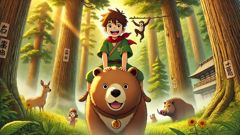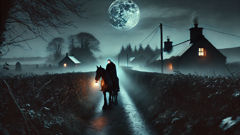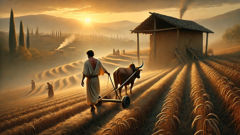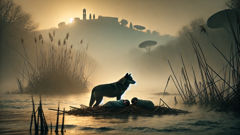Introduction
In the lush embrace of Mount Ashigara, where ancient cedars pierce the morning mist and the cry of a hawk carries for miles, a legend took root that has endured in the hearts of the Japanese people for centuries. Here, amid emerald slopes and sparkling streams, a child unlike any other was born—a boy whose strength was whispered about in every village from Sagami to Suruga. His name was Kintaro, the Golden Boy. Raised not among humans, but in the wilderness under the watchful eyes of a kind mountain woman and the untamed beasts of the forest, Kintaro’s early life became the stuff of fireside stories and festival songs. The mountains were his cradle, the rivers his playground, and every tree and stone echoed with the laughter and courage of this remarkable child. He rode bears, wrestled with wild boars, and played with monkeys as his closest friends. The animals, sensing his pure heart and gentle spirit, became his family and guardians. Kintaro’s legend is more than a tale of superhuman feats; it’s a celebration of the harmony between human and nature, the courage to face monstrous challenges, and the discovery of destiny in the most unlikely places. Journey with us to a time when spirits roamed the hills, and the wild could shape a hero, as we uncover the story of Kintaro—the boy whose golden spirit blazed as brightly as the rising sun.
Born in the Shadow of the Mountain
Long before Kintaro’s name became a song on every villager’s lips, his story began in hardship. Deep in the forested folds of Mount Ashigara, far from the eyes of society, lived a woman named Yama-uba, the Mountain Witch. Some said she was a sorceress, others whispered she was merely a woman cast out by cruel fate. But those who had seen her spoke of a gentle soul, silver-haired and kind-eyed, who moved with quiet purpose among the pines.

One stormy night, as thunder rolled across the peaks and the rain beat against mossy stones, Yama-uba discovered a small, abandoned child at the edge of her hut. He was swaddled in crimson cloth, and a faint golden glow seemed to emanate from his skin. The old woman, whose heart had grown tender after years of solitude, brought the boy inside, naming him Kintaro—"Kin" for gold, and "taro" for eldest son.
Kintaro grew quickly, stronger and heartier than any child Yama-uba had known. By the time he could walk, he could lift stones twice his size and uproot saplings with a giggle. But it wasn’t just strength that marked him as extraordinary. He spoke to animals in the gentle language of gestures and laughter, and soon, the creatures of the forest flocked to his side. Monkeys, bears, deer, hares, and even the wary fox found comfort in his presence.
As Kintaro explored the woods, Yama-uba taught him wisdom passed down from the spirits. She showed him which mushrooms healed and which were deadly, how to read the clouds, and how to move through the trees so silently that even the sparrows didn’t startle. The boy learned not only to live off the land but to cherish and protect it. He grew up wild but never savage—always kind, always curious.
One morning, as cherry blossoms drifted through the air and sunlight danced on the river, Kintaro noticed a bear cub struggling to free its paw from a hunter’s snare. Without hesitation, he rushed to help, soothing the cub with soft words. With a single effortless motion, he broke the iron trap and carried the cub to safety. This act of courage and compassion earned him the respect and affection of the bear clan, and from then on, a great brown bear—whom Kintaro called Kuma—became his constant companion.
Yama-uba watched her golden boy with pride and a flicker of worry. She knew the world beyond the trees was not as gentle as the forest. But for now, she let Kintaro’s days be filled with joy and discovery. The animals became his friends and teachers, each imparting a lesson: the monkey taught him cleverness, the deer swiftness, the hare patience, and the bear resilience. Kintaro’s laughter rang out like a bell, echoing through the valleys. Yet, in the hush of twilight, Yama-uba would whisper prayers to the mountain, hoping her adopted son would never have to face the cruelty that drove her to these woods. But destiny, as ever, was listening—and soon, Kintaro’s world would grow larger than he could ever imagine.
Trials of Friendship and Strength
Kintaro’s days in the wilderness became legendary not just for his feats of strength, but for the joy and harmony he brought to every corner of Mount Ashigara. As he grew older, his adventures took on greater challenges. With Kuma by his side, he explored deeper into the wilds than any human ever dared. The mountains were alive with secrets—hidden waterfalls, ancient trees twisted by time, and mysterious footprints hinting at creatures older than memory.
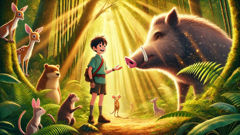
The animals loved Kintaro dearly. Each morning, a procession would greet him at the clearing: the mischievous monkey Saru, always eager for a contest; swift Usagi the hare, who taught him to leap over fallen logs; and stately Shika the deer, who guided him through the dense undergrowth. Together, they raced the wind, wove through bamboo groves, and swam in crystal pools beneath the watchful gaze of the mountain’s spirit.
But even in paradise, dangers lurked. One summer evening, a wild boar—the largest anyone had ever seen—thundered into the valley, its tusks gleaming like knives. The beast was furious, driven mad by hunger and pain from a wound inflicted by poachers. The animals scattered in terror as it charged towards Yama-uba’s hut.
Kintaro stood firm. With a shout that rang through the trees, he leapt between the boar and his home. The two clashed in a spray of dirt and pine needles. The boar’s strength was immense, but Kintaro’s heart was bigger. He wrestled the beast to the ground, subduing it not with anger but with calm resolve. Once pinned, he noticed a poisoned dart embedded in its flank. Carefully, he removed the dart and bound the wound with herbs. The boar, grateful and humbled, became yet another companion.
Word of Kintaro’s deeds began to spread beyond the forests. Hunters whispered of a golden boy who could bend iron and run faster than deer. Villagers who glimpsed him from afar saw him riding on Kuma’s back or skipping stones across rivers with Saru. Some came seeking his help; others sought to challenge or capture him, thinking his power could be harnessed for wealth or war. But Kintaro cared nothing for fame. He was happiest with his friends, listening to Yama-uba’s stories under the stars.
One day, a stranger appeared at the edge of the woods—a tall man in samurai armor, bearing a sword with an intricate dragon-etched hilt. He introduced himself as Minamoto no Yorimitsu, a noble warrior seeking allies to defend the land from monsters that plagued the region. Yorimitsu had heard tales of Kintaro’s strength and came to see if the legend was true. Instead of a contest, Yorimitsu proposed a test: could Kintaro out-wrestle his fiercest retainers—men known throughout the land for their might? Kintaro accepted with a grin.
The wrestling matches took place on a sun-dappled field. Kintaro faced warrior after warrior, each more formidable than the last. Yet he dispatched them all with laughter and gentle respect—never harming, always helping them up after each fall. Yorimitsu was amazed, but more than that, he was moved by Kintaro’s humility and kindness. When the last retainer had yielded, Yorimitsu knelt before Kintaro and asked him to join his band of heroes to protect the weak and fight evil.
Kintaro was torn. His heart belonged to the mountains and his animal friends, but he also felt the call of destiny. Yama-uba, watching from the shadows, gave her blessing, reminding him that courage was not just the power to fight, but also the wisdom to know when to step into the unknown. With a heavy but hopeful heart, Kintaro bade farewell to his companions—promising always to return—and followed Yorimitsu towards new adventures. Yet the mountain kept his laughter in its echoes, and the animals watched the path he took, knowing that their friend’s legend had only just begun.
The Hero Emerges: Kintaro’s Journey Beyond Ashigara
Leaving Mount Ashigara behind was the hardest thing Kintaro had ever done. Every step away from the familiar song of birds and the rustle of ancient cedars felt like leaving a piece of himself behind. Yet, excitement stirred within him. He’d always wondered what lay beyond the green canopy—what towns looked like, how people lived, and what it meant to be a hero among humans.
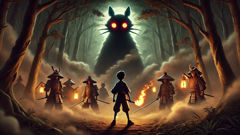
The journey with Minamoto no Yorimitsu was unlike anything Kintaro had known. The samurai and his band of loyal retainers—Sakata no Kintoki, Watanabe no Tsuna, Urabe no Suetake, and Usui Sadamitsu—were famed across the provinces for battling demons and protecting the innocent. They welcomed Kintaro warmly, though some were skeptical that a wild child could match their skills.
As they traveled from village to village, stories of monsters reached them at every turn. In one village, an entire rice harvest had vanished overnight; in another, children spoke of shadows lurking at the edge of lantern light. But Kintaro was unafraid. He faced every challenge with a bright spirit and unshakable courage.
Their greatest trial came deep in the forests north of Kyoto, where rumors told of Shuten-doji, the dreaded ogre king. Shuten-doji’s lair was said to be a place of horror—twisted trees, poisonous mists, and the bones of those who’d dared to challenge him. Yorimitsu’s band prepared for battle with ritual and strategy, but Kintaro relied on his mountain instincts. He listened to the wind, watched for subtle signs—bent branches, disturbed moss, silent birds—that others overlooked.
When night fell and their torches flickered against the cold, they approached the ogre’s lair. Shuten-doji was immense—taller than two men, with crimson skin and eyes like burning coals. He roared at their approach, swinging a spiked club that shattered rocks and sent shockwaves through the ground.
The battle was fierce. Yorimitsu and his retainers fought bravely, but it was Kintaro who turned the tide. He darted between the ogre’s blows with the speed of a deer, landed powerful strikes like the paws of Kuma, and distracted Shuten-doji with tricks he’d learned from Saru. As the ogre faltered, Yorimitsu struck the final blow, sending Shuten-doji crashing to the ground. In gratitude, the villagers hailed Kintaro as a hero.
But it wasn’t just his strength that won their hearts. Kintaro treated friend and stranger alike with compassion. He helped rebuild homes, played with children in the fields, and taught villagers how to live in harmony with nature—sharing wisdom learned from Yama-uba and his animal friends.
In time, Kintaro came to be known as Sakata no Kintoki, one of Yorimitsu’s Four Heavenly Kings. Yet no matter how far he traveled or how many legends grew around his name, he never forgot the mountain or the friends who had shaped his heart. Sometimes, in quiet moments after victory, he’d sit by a riverbank and listen for the distant echoes of laughter drifting down from Mount Ashigara, certain that the spirit of home was always with him.
Conclusion
Kintaro’s legend endures not simply because of his superhuman strength or his victories over monsters, but because of the golden heart that shone through every act. Raised in the wild by love and nurtured by friendship, Kintaro bridged two worlds—one rooted in nature’s quiet wisdom, the other in humanity’s quest for justice. He showed that true courage is not just in facing giants or ogres, but in kindness to all creatures and the humility to learn from every teacher, whether beast or human. Even today, children across Japan listen to his story and find hope in his journey—a boy born in shadow, lifted by love, destined to shine. And somewhere on Mount Ashigara, if you listen closely at dawn or dusk, you might still hear laughter ringing out between the ancient trees—a reminder that heroes are shaped by the wild places of the heart.

